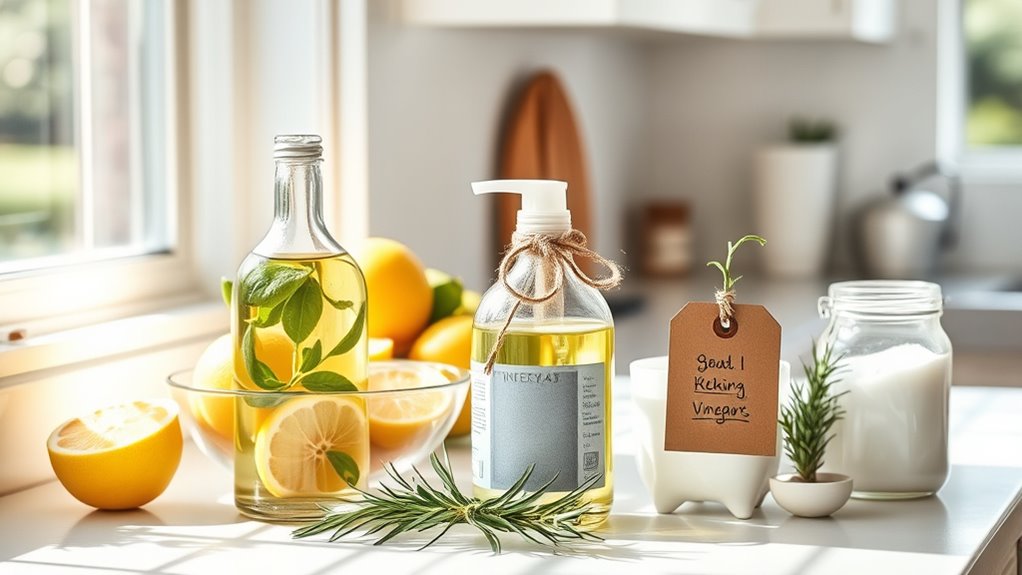Making your own eco-friendly cleaners lets you cut down on waste and avoid harsh chemicals, creating a safer home environment. You can control ingredients by mixing natural solutions like vinegar, baking soda, and lemon juice, and add essential oils for fresh scents and antibacterial properties. Reusing tools like spray bottles and cloths reduces plastic waste and saves money. Keep exploring how simple ingredients and sustainable tools can transform your cleaning routine into a healthier, greener practice.
Key Takeaways
- Combine simple ingredients like vinegar, baking soda, and lemon for effective, chemical-free cleaning solutions.
- Add natural essential oils such as lavender or eucalyptus to enhance scent and antibacterial properties.
- Use reusable tools like glass spray bottles and microfiber cloths to reduce plastic waste.
- Customize cleaners for different surfaces, including paste for stains or vinegar mixes for soap scum removal.
- Maintain eco-friendly habits by regularly cleaning tools and choosing sustainable, natural ingredients.

Are you looking for an eco-friendly way to keep your home sparkling? Making your own cleaners is a simple, effective method that reduces waste and minimizes exposure to harsh chemicals. When you craft your own solutions, you control the ingredients, ensuring they’re safe for both your family and the environment. Plus, you can customize natural scent options to keep your space smelling fresh without relying on artificial fragrances. Using reusable cleaning tools further enhances your efforts—think microfiber cloths, glass spray bottles, and bamboo scrub brushes. These tools cut down on single-use plastics and last for years, making your cleaning routine more sustainable.
Starting with natural scent options is easy and fun. Instead of synthetic air fresheners, you can add essential oils like lavender, lemon, or eucalyptus to your homemade cleaners. Not only do these oils leave a pleasant aroma, but many also have antibacterial properties that boost your cleaning power. A few drops of tea tree or peppermint oil in your vinegar spray can keep your home smelling clean and feeling fresh. You might also experiment with dried herbs or citrus peels steeped in vinegar for an extra-natural scent infusion. These options allow you to avoid synthetic fragrances that can trigger allergies or respiratory issues. Incorporating skin protection practices like proper ventilation and limiting exposure can help maintain your health during cleaning routines.
When it comes to reusable cleaning tools, think beyond traditional paper towels. Microfiber cloths are excellent because they trap dirt and bacteria with minimal water and cleaning agents. Instead of disposable wipes, opt for washable cloths that can be used repeatedly. Reusable spray bottles made of glass or sturdy plastic are perfect for your homemade cleaners, letting you refill and reuse them endlessly. Bamboo scrub brushes and wooden handles also reduce plastic waste and are gentle on surfaces. By investing in quality, eco-friendly tools, you make your cleaning routine more sustainable and cost-effective over time.
Crafting your own cleaners isn’t complicated. Combine white vinegar, baking soda, and water for versatile all-purpose solutions. Add your favorite natural scent options to make the process more enjoyable. For tougher stains, a paste of baking soda and a little water works wonders, while a mix of lemon juice and vinegar can tackle soap scum and mineral deposits. Keep your reusable tools in good condition by washing them regularly—this ensures they stay effective and hygienic. The more you incorporate these practices, the more you’ll see how easy and rewarding green cleaning can be.
In the end, making your own eco-friendly cleaners with natural scent options and reusable tools empowers you to create a healthier, more sustainable home environment. It’s a simple change that makes a significant impact, reducing waste and exposure to chemicals while keeping your space fresh and inviting.
Frequently Asked Questions
Are Homemade Cleaners as Effective as Commercial Products?
Homemade cleaners can be just as effective as commercial products if you choose the right ingredients, ensuring good chemical efficiency. While they often lack the strong scents of store-bought options, you can add natural essential oils to improve scent longevity. In many cases, DIY solutions work well for everyday cleaning tasks, but for tougher grime or disinfecting, commercial products might offer superior strength and reliability.
How Long Do DIY Eco-Friendly Cleaners Last?
Your DIY eco-friendly cleaners can last surprisingly long—up to several months—if stored properly. Typically, their shelf life depends on ingredients like vinegar or essential oils, which act as natural preservatives, but exposure to air or sunlight can shorten their storage duration. To maximize effectiveness, keep them in airtight containers away from heat and light. With proper storage, your homemade cleaners could be just as reliable as commercial ones for a good while.
Can Green Cleaners Be Used on All Surfaces?
Yes, green cleaners can be used on most surfaces, but you should verify surface compatibility first. They offer excellent cleaning versatility, effectively handling countertops, glass, and even some fabrics. However, avoid using them on delicate surfaces like marble or hardwood without testing in a small area first, as certain ingredients might cause damage. Always read your cleaner’s instructions to ensure safe and effective use across different surfaces.
Are DIY Cleaners Safe for Pets and Children?
Think of your home as a sanctuary where pet safety and child-friendly ingredients are the guardians. DIY cleaners can be safe if you choose natural, non-toxic ingredients like vinegar, baking soda, and lemon juice. Always avoid harsh chemicals, and keep your little explorers and furry friends in mind. By carefully selecting ingredients, you create a cleaning potion that’s gentle yet effective, turning your space into a safe haven for everyone.
What Are Common Mistakes to Avoid When Making Green Cleaners?
When making green cleaners, avoid common mistakes like not understanding chemical reactions, which can cause unexpected results. Always source ingredients carefully to verify they’re safe and eco-friendly, rather than using cheap or questionable products. Measure ingredients precisely to prevent harmful reactions, and test your cleaner on small areas first. By paying attention to these details, you create effective, safe green cleaners that are gentle on your home and the environment.
Conclusion
By making your own eco-friendly cleaners, you’re not only protecting the environment but also creating a healthier home for yourself. It’s simple, cost-effective, and empowering to take control of what goes into your cleaning routine. Why settle for store-bought chemicals when you can craft effective solutions with natural ingredients? Embrace this sustainable approach and enjoy the satisfaction of a cleaner, greener space—your planet and your family will thank you for it.









